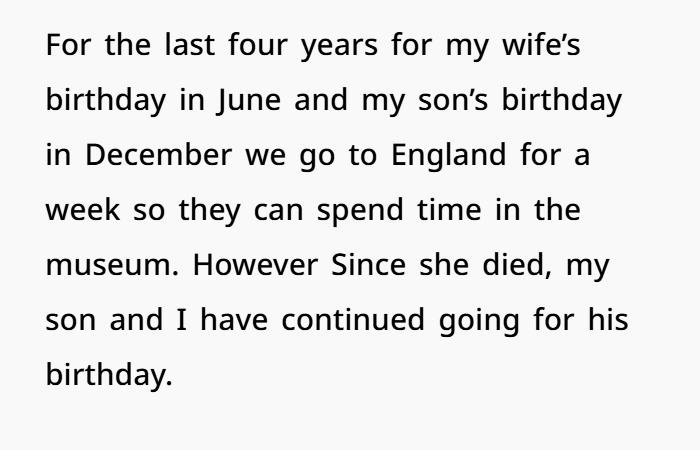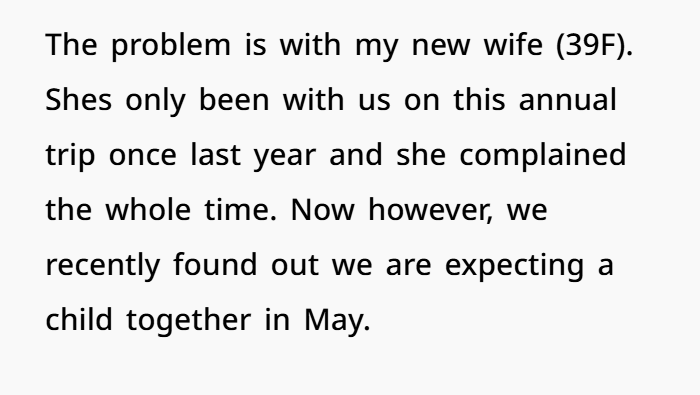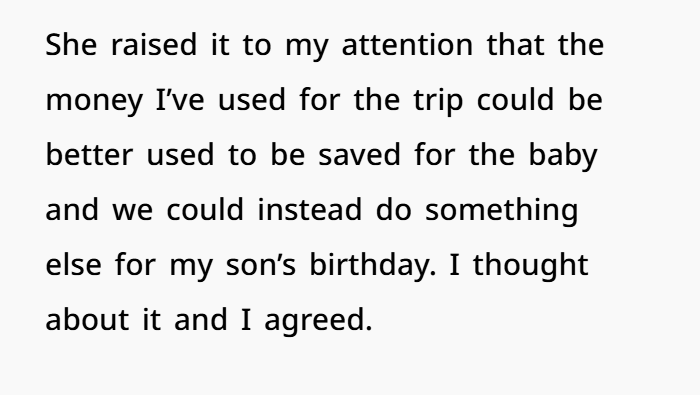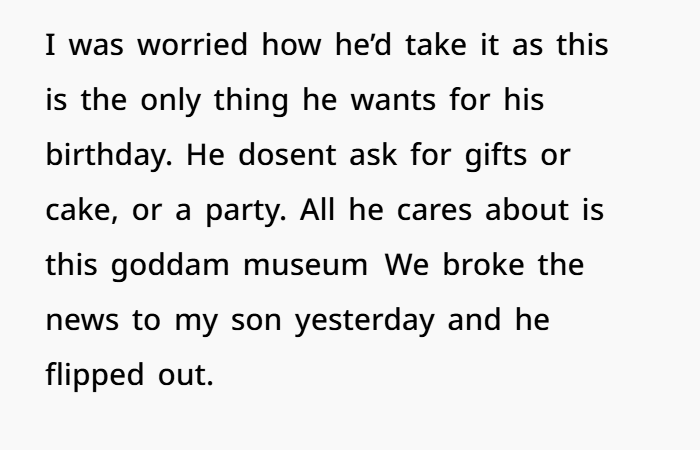AITA for Canceling My Son’s Annual Trip to the British Museum to Save for Our New Baby?
A 47-year-old father finds himself at the heart of a familial conflict after deciding to cancel his 14-year-old son’s cherished annual birthday trip to the British Museum in London. This tradition, initiated with his late wife, served as a bonding experience rooted in shared interests in art and history. Since her passing two years prior, the father and son have continued the tradition, making it a significant emotional anchor for the grieving teenager.
The decision to forego the trip stems from financial considerations related to the father’s current wife, who is expecting a child in May. She suggested reallocating the funds from the trip to prepare for the upcoming baby, proposing alternative celebrations for the son’s birthday. The son’s reaction was one of profound distress, leading to a heated argument and subsequent silence between father and son. The father now grapples with guilt and seeks clarity on whether his actions were justified.
Sometimes, parents might not understand the emotions of their children and may make decisions that cause them tremendous pain

The poster explained that his first wife had passed away two years ago and that his son, who had been close to her, took it very hard









Grief, Parenting, and Financial Realities—The High Cost of Emotional Sacrifices
This scenario isn’t just about missing a vacation—it’s about a symbolic lifeline being cut. The British Museum trip stands as more than a holiday; it’s a sacred ritual for the son, a way to remain connected to his deceased mother. To fully grasp the emotional impact, it’s essential to understand how grief, especially in children, manifests and why such rituals matter.
The Psychological Importance of Ritual in Grieving Children
According to the American Academy of Pediatrics, rituals can be an integral part of a child’s grieving process. These repeated actions provide structure, meaning, and a sense of continuity after a profound loss. In this case, the annual museum trip is not just leisure—it’s therapy. A study published in the Journal of Family Psychology emphasizes that rituals associated with the deceased can help children cope better and integrate the loss into their ongoing lives in a healthy way (APA PsycNet).

By removing this outlet—especially without offering a similarly meaningful alternative—the father may have unintentionally disrupted a key coping mechanism for his son. While financial planning for a new child is undoubtedly important, the psychological toll of dismantling a coping ritual should be weighed just as seriously.
Financial Planning vs. Emotional Investment: Is There a Middle Ground?
From a financial standpoint, the father’s decision aligns with smart household budgeting. With a baby on the way, expenses are expected to surge—everything from prenatal care to diapers to childcare adds up quickly. According to the USDA, the average cost of raising a child to age 18 in the U.S. is approximately $233,610 (USDA Report). However, not all budgeting decisions need to be zero-sum.
What’s often overlooked in these conversations is the concept of value-based spending. Behavioral economists like Dan Ariely have long advocated for spending that aligns with one’s core values—be it love, connection, or legacy. If the father re-evaluated his spending in this light, he might find a way to both save and preserve the tradition—perhaps by shortening the trip, staying with friends or family in London, or even exploring scholarships or cultural grants designed for grieving children.
Step-Parent Dynamics and Emotional Perception
Another layer of tension in this story is the strained relationship between the son and his stepmother. Blended families frequently face these kinds of emotional landmines. A report by the National Stepfamily Resource Center highlights that it can take several years for blended families to feel fully integrated. Children, particularly teenagers, often feel loyalty binds—where showing affection or acceptance of a stepparent feels like a betrayal to their biological parent, especially one who has passed.
This tension is likely exacerbated by the stepmother’s reported behavior during the last trip, where she “complained the whole time.” For a grieving child, such actions can read as dismissive or even hostile, fueling resentment. And when she’s the one perceived as canceling the trip, that resentment bubbles over into full-blown emotional conflict. In such cases, empathy and communication training for stepparents can play a crucial role in bridging the gap. Experts from the American Association for Marriage and Family Therapy stress the importance of building trust slowly, through shared interests and respectful boundaries (AAMFT).

Yelling, Emotional Regulation, and Repair
Perhaps the most raw and revealing moment in this story is when the father yells at his son during the argument—a reaction that, while human, can compound the emotional injury. Yelling during emotionally charged moments often leads to what psychologists call emotional flooding—a state where the child’s nervous system becomes overwhelmed, making it difficult to process or resolve the conflict constructively. Dr. John Gottman, renowned for his work on emotional intelligence in parenting, notes that emotional coaching is far more effective than punishment or yelling in moments of stress (Gottman Institute).
People felt that the man was disregarding his son’s emotions in favor of pleasing his wife and that the boy would end up hating him in the future





However, all is not lost. Repair is possible and critical. Research shows that children are incredibly resilient and that a sincere apology, combined with a willingness to listen and validate their feelings, can rebuild trust. The father might consider a heart-to-heart conversation where he acknowledges his son’s pain, explains the broader context of the decision, and, ideally, involves him in brainstorming a new way to honor his mother.

